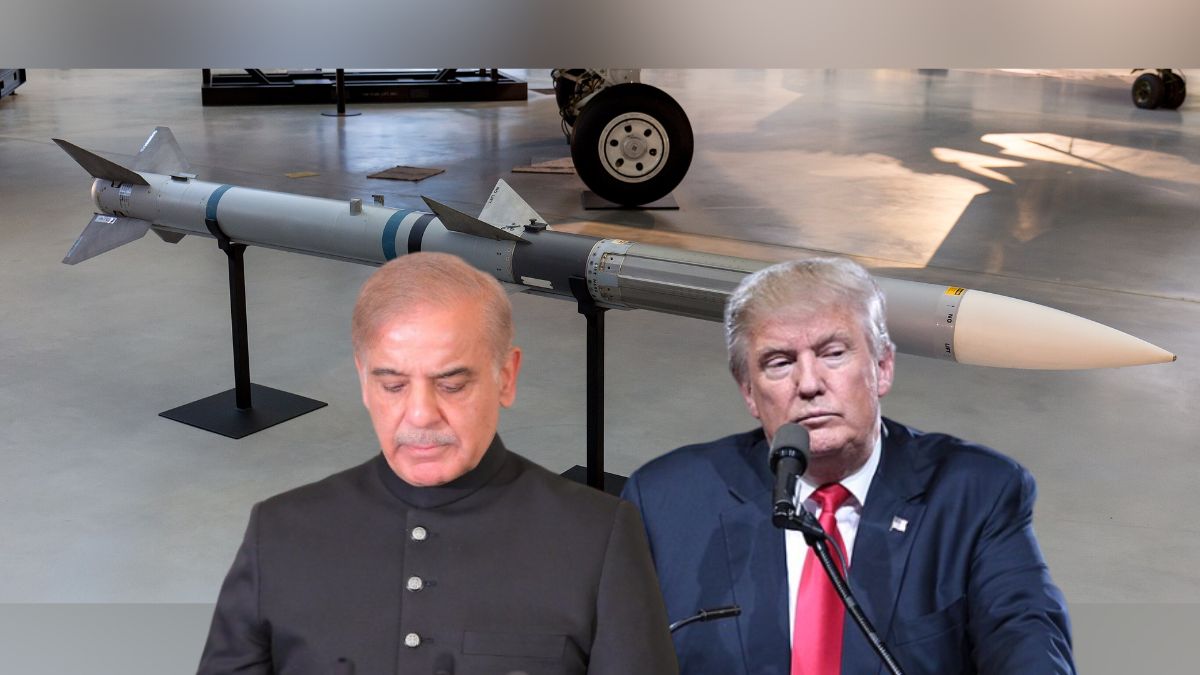US Clarifies AMRAAM Contract With Pakistan: No New Missiles, Only Sustainment Support Amid Regional Sensitivities

Image courtesy: RNA
In a move that has stirred geopolitical discussions in South Asia, the US Department of Defense has clarified that its recent Foreign Military Sales (FMS) contract modification, which includes Pakistan among multiple nations, does not involve the delivery of new Advanced Medium-Range Air-to-Air Missiles (AMRAAMs).
The clarification came following speculation in the media and regional concerns regarding a potential enhancement of Pakistan’s air combat capabilities.
What did the US Department of War say about AMRAAMS?
According to the Department of War’s September 30, 2025, release, the amendment pertains solely to sustainment, spares, and maintenance support for existing AMRAAM systems, without any new missile deliveries or capability upgrades.
The Pentagon emphasised that “no part of this referenced contract modification is for deliveries of new AMRAAMs to Pakistan,” adding that it does not enhance the country’s existing inventory or operational effectiveness.
What does the US decision on AMRAAMS mean?
The $41.68 million firm-fixed-price modification was awarded to Raytheon Co., Tucson, Arizona, under contract number FA8675-23-C-0037, which now has a cumulative value of $2.51 billion.
The work, which will be carried out in Tucson through May 2030, covers sustainment and production activities for AMRAAM variants for several US allies and partners, including the United Kingdom, Germany, Finland, Australia, Japan, Saudi Arabia, and Pakistan, among others.
The contract is funded through a mix of US Navy weapons procurement ($7.6 million), US Air Force operation and maintenance funds ($10.7 million), and Foreign Military Sales (FMS) contributions ($9.16 million). Oversight will be managed by the Air Force Life Cycle Management Center’s Weapons Superiority Branch at Robins Air Force Base, Georgia.
Why is this clarification important?
The clarification assumes significance amid ongoing tensions between India and Pakistan, particularly over Islamabad’s defence modernization efforts.
India has repeatedly expressed concerns about Western military assistance to Pakistan, arguing that such support, especially involving advanced missile systems, could destabilise the regional balance of power.
In 2022, a similar announcement by the US State Department approving a $450 million F-16 sustainment package for Pakistan drew sharp reactions from New Delhi, which viewed it as inconsistent with Washington’s counterterrorism commitments.
The United States, however, maintained that the support was intended to sustain existing assets and strengthen Pakistan’s counterterrorism capabilities, not to upgrade its fleet.
What does this mean for the US, India, and Pakistan?
The latest AMRAAM sustainment clarification follows a familiar pattern, underscoring Washington’s attempt to balance strategic defence partnerships with India while maintaining limited military engagement with Pakistan.
Analysts believe that while the sustainment contract is routine, its timing, amid evolving India-US defence cooperation and growing Indo-Pacific security collaboration, adds diplomatic sensitivity.
Why is this an American balancing act?
The AMRAAM, manufactured by Raytheon, remains a cornerstone of Western air-to-air weapon systems, used by more than 30 nations. While Pakistan already operates AMRAAMs for its F-16 fleet, the US’s assurance that the current deal does not expand or modernise that capability appears intended to allay Indian apprehensions and reaffirm Washington’s commitment to transparency in regional defence dealings.
With this clarification, the United States seeks to reaffirm that its defence ties with Pakistan are limited to maintenance support, even as it deepens strategic defence cooperation with India through joint exercises, technology-sharing frameworks, and co-development initiatives under the INDUS-X partnership.







